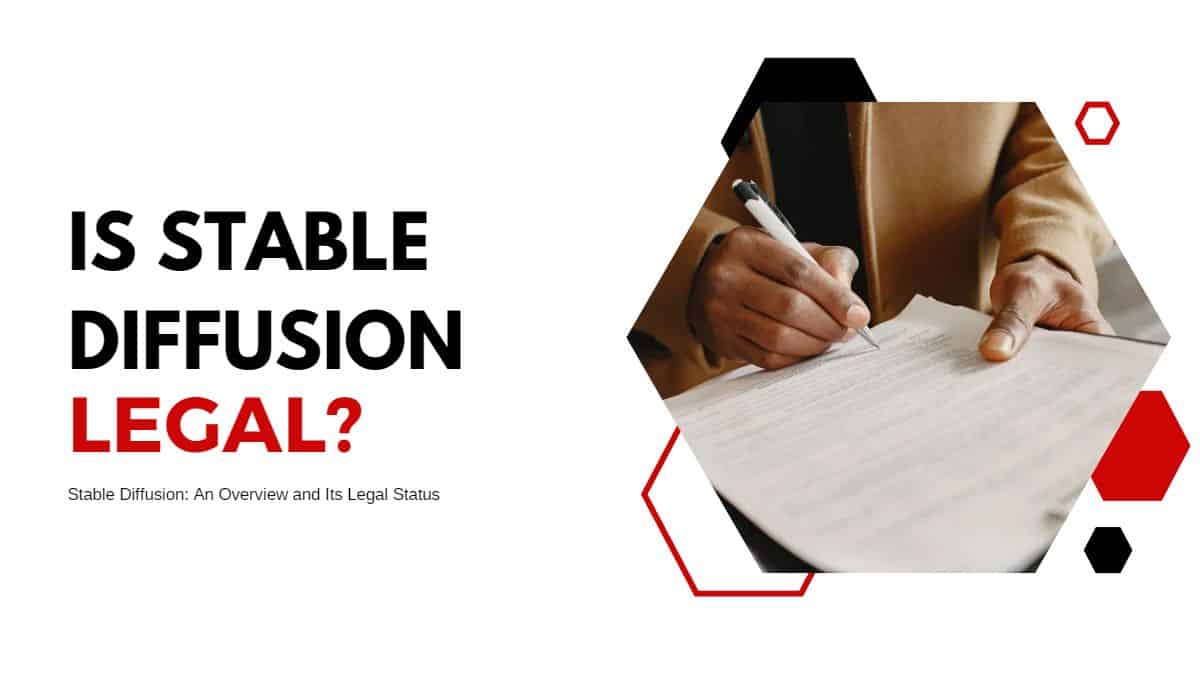Is Stable Diffusion Legal?

Table of Contents
Artificial intelligence (AI) is a rapidly evolving field, and new AI model architectures, such as Stable Diffusion, are constantly being developed.
But when it comes to using AI models for real-world applications, it’s important to understand the legal implications of these technologies. Let's find out more about the legal considerations surrounding Stable Diffusion, so continue reading until the end.
So, is Stable Diffusion Legal?
Stable Diffusion is an AI model architecture that uses a diffusion process to generate synthetic data that can be used to train and refine AI models. This process helps to improve the stability and reliability of AI models and reduce the risk of overfitting.
The legality of Stable Diffusion, like any AI model architecture, depends on how it is used and the specific legal requirements of the jurisdiction in which it is used. In general, there are three main legal considerations when it comes to AI models like Stable Diffusion:
Data Privacy
When using AI models, it’s significant to ensure that the data being used is collected and used in accordance with applicable data privacy laws. This means you must have appropriate consent mechanisms and ensure data is stored and processed securely.
Discrimination
AI models can potentially perpetuate or amplify existing biases in the data under use to train them. This can lead to discrimination against certain groups, which may be illegal in some jurisdictions. As such, it’s essential to carefully evaluate the potential for bias in AI models and take steps to mitigate it.
Intellectual Property
Using synthetic data generated by Stable Diffusion may raise intellectual property issues, particularly if the data is similar to existing data owned by another party. It’s critical to ensure that you have the right to use any data to train AI models. You mustn’t be infringing on any third-party intellectual property rights.
How to Ensure Legal Use of Stable Diffusion?
There are several steps that you can take to ensure that you are using Stable Diffusion in a legal way.
Understand the Legal Requirements
Before implementing Stable Diffusion, it’s essential to understand the legal requirements that apply to its use. This may include data privacy, anti-discrimination, and intellectual property laws.
Use Appropriate Data
To avoid potential legal issues, it’s imperative to use appropriate data when training AI models. This means ensuring that you must collect all data using the model in accordance with applicable laws. It will also enable you to identify and address any potential biases accordingly.
Obtain Appropriate Consent
It’s important to obtain appropriate consent from individuals in accordance with applicable data privacy laws. This is especially true if you collect and use personal data to train AI models.
Monitor for Bias
It’s essential to carefully monitor AI models for bias and take steps to mitigate it where necessary. It will enable you to avoid any potential discrimination.
Obtain Legal Advice:
It is significant to obtain legal advice from a qualified professional. This is especially true if you are unsure about the legality of using Stable Diffusion in a particular context.
Is It Legal to Use Stable Diffusion AI for Commercial Purposes?
Yes, using Stable Diffusion AI for commercial purposes is legal as long as you have the necessary permissions and licenses. However, you should be aware of any applicable laws and regulations related to data privacy and intellectual property rights, which may vary depending on your location and the nature of your business.
Can I Use Stable Diffusion AI to Generate Data for Research Purposes?
Yes, you can use Stable Diffusion AI to generate synthetic data for research purposes if you comply with any ethical guidelines and regulations related to research in your field. However, you should be aware of any restrictions on using synthetic data in your research and ensure that your research results are valid and reliable.
Conclusion
You need to understand the legal requirements for AI models like Stable Diffusion. It will enable you to take appropriate steps to address potential legal issues.
You can ensure that you are using AI models in a responsible and legally compliant manner. This will help you avoid potential legal liabilities and reputational harm. It will ensure you’re using this powerful technology most effectively.
